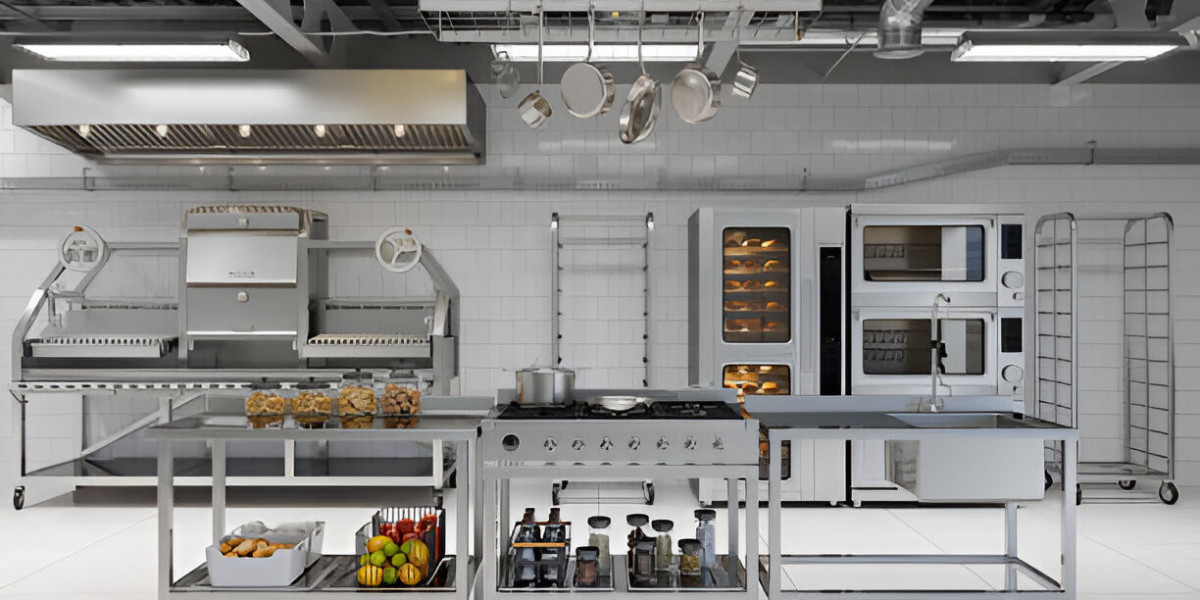Opening a restaurant in Dubai is an exciting venture, but success in the food service industry begins with the right tools. Commercial kitchen equipment is the backbone of any restaurant. Whether you're opening a small café or a large dining establishment, choosing the right Kitchen equipment for a restaurant for smooth operations, food safety, and efficiency.
This guide explores the types of equipment needed, factors to consider when buying, and tips tailored specifically for the Dubai market.
Understanding the Basics of Commercial Kitchen Equipment
What Defines Commercial Kitchen Equipment?
Commercial kitchen equipment includes heavy-duty machines and tools used for food preparation and service in a professional kitchen setting. These are designed to handle higher volumes and prolonged use compared to residential appliances.
Why Dubai-Specific Considerations Matter
Dubai’s restaurant industry follows strict regulations regarding hygiene, fire safety, and operational efficiency. Equipment must meet Dubai Municipality and Civil Defense standards to ensure compliance and avoid penalties.
Essential Equipment Categories for Restaurants
Cooking Equipment
This category covers the core machinery used for preparing meals.
Gas and Electric Ranges: Useful for cooking various dishes at once.
Ovens: Convection and combi ovens are ideal for restaurants that require baking or roasting.
Grills and Griddles: Suitable for steakhouses or cafes.
Deep Fryers: A must-have for fast food and fried item menus.
Refrigeration and Storage
Proper cold storage ensures food safety and preserves ingredient quality.
Reach-in Refrigerators and Freezers: Common in most restaurant kitchens.
Undercounter Chillers: Great for tight spaces.
Walk-in Cold Rooms: Required for larger operations or bulk storage.
Food Preparation Tools
Efficient food prep tools can significantly save time and labor.
Food Processors: Chop, blend, and puree ingredients quickly.
Meat Slicers and Grinders: Essential for restaurants that prepare their meat in-house.Mixers: Required for bakeries, pizzerias, and dessert shops.
Dishwashing and Sanitation
Maintaining hygiene is critical in Dubai’s food service industry.
Commercial Dishwashers: Ensure faster turnaround and cleaner dishes.
Sinks and Work Tables: Stainless steel options are durable and easy to clean.
Grease Traps and Waste Disposal Units: Prevent plumbing issues and meet health regulations.
Ventilation and Safety Equipment
Dubai regulations require proper ventilation and fire safety setups.
Exhaust Hoods: Remove heat, smoke, and airborne grease.
Fire Suppression Systems: Must be integrated into hood systems.
First Aid Kits and Fire Extinguishers: Mandatory in every kitchen space.
Factors to Consider When Choosing Equipment in Dubai
Compliance with Local Regulations
Dubai has specific rules about kitchen design and safety. Always ensure equipment is approved by relevant authorities like the Dubai Municipality and Civil Defense.
Size and Layout of the Kitchen
Choose equipment based on your available kitchen space. Overcrowding leads to workflow inefficiencies and potential safety hazards.
Energy Efficiency
Dubai’s hot climate increases cooling and energy demands. Choose energy-efficient models to lower your utility costs over time.
Ease of Maintenance
Choose equipment that is easy to clean and maintain. Stainless steel options are often preferred due to their durability and hygiene benefits.
Supplier Support and Spare Parts Availability
Ensure that the equipment you choose has accessible servicing options and replacement parts in Dubai. Lack of support can lead to long downtimes during breakdowns.
Tips for Setting Up a Restaurant Kitchen in Dubai
Plan Your Kitchen Based on Menu Needs
Let your menu guide your equipment decisions. A bakery will need ovens and mixers, while a grill restaurant may need specialized charbroilers and ventilation.
Invest in Quality Over Quantity
Don’t compromise on quality to save costs. High-end, durable equipment will last longer and reduce maintenance issues.
Consider Future Expansion
Choose modular or scalable equipment if you plan to expand your menu or seating capacity in the future.
Check Warranty and After-Sales Services
Opt for products with warranties and check if the supplier offers maintenance contracts. Reliable after-sales service is essential in keeping your kitchen operational.
Common Challenges Faced by Restaurants in Dubai
High Initial Investment
Restaurant equipment can be expensive. Many startups in Dubai explore lease-to-own or rental options to reduce upfront costs.
Adapting to High Temperatures
The heat in Dubai can affect kitchen performance, especially refrigeration units. Invest in climate-appropriate equipment with strong cooling systems.
Managing Import Delays
Many kitchen tools are imported, which can lead to delays. Plan equipment procurement in advance and maintain backup options where possible.
Sustainability Trends in Dubai’s Food Industry
Eco-Friendly Equipment
Restaurants are now leaning towards low-emission cooking appliances, energy-efficient dishwashers, and LED-lit refrigerators.
Waste Reduction Practices
Dubai encourages restaurants to minimize food waste. Equipment like portion control scales and composting units are gaining popularity.
Water-Saving Technologies
Water-efficient dishwashers and low-flow faucets are ideal choices in Dubai where water conservation is a priority.
Final Thoughts
Outfitting a restaurant kitchen in Dubai requires more than just buying cooking tools. It involves strategic planning, regulatory compliance, and long-term thinking. By selecting equipment tailored to your menu, kitchen layout, and local requirements, you can set up a safe, efficient, and future-ready kitchen.
Take time to research your options, understand local standards, and consult with professional kitchen planners if needed. The right choices today will set the foundation for your restaurant’s long-term success.














